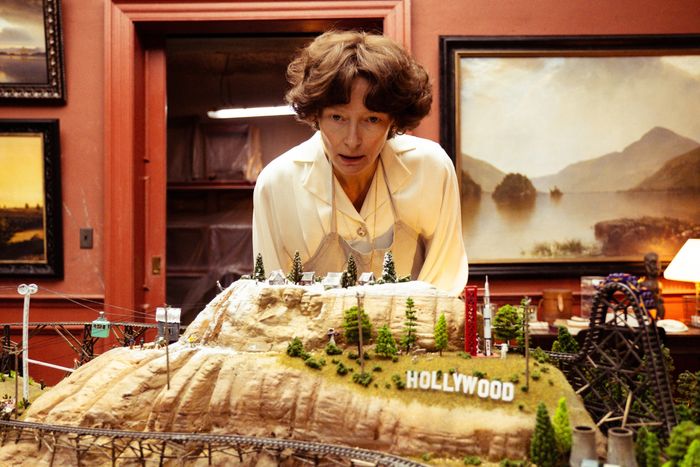
The central concept of The End is so outlandish that one wants to embrace the movie sight unseen. The film, directed by the award-winning documentarian Joshua Oppenheimer, is a post-apocalyptic musical about the comfortable life of an absurdly wealthy family, as they chill in their well-stocked climate bunker after their own actions have wiped out humanity. The father and the mother are played by two of modern cinema’s most supremely talented eccentrics, Michael Shannon and Tilda Swinton. Their grown son is played by 1917’s George MacKay, a 32-year-old actor whose pale, boyish looks still allow him to play odd innocents. The desperate intruder who shows up in their underground bunker one night (that’s not a spoiler — there’s always a desperate intruder in these types of stories) is played by The Queen’s Gambit and Obi-Wan Kenobi co-star Moses Ingram, who brings just the right amount of are you fucking kidding me? bewilderment as she gazes at this family of weirdos and the homey elegance of her new surroundings after years spent in the uninhabitable wasteland outside.
And yes, it is a musical. The songs, composed by Joshua Schmidt and Marius de Vries, replicate the graceful harmonies of Broadway’s Golden Age, with lyrics that edge into the caustic-poetic. “To think this all leads to us,” the parents delusionally croon to their child. “To think this all ends with you. Only you” — as if they’re anointing him with a halo of flowers instead of foretelling his lonely death. There are even a couple of scattershot dance numbers. The songs’ shimmering melodies keep threatening to dissolve into the atonal, musically replicating the sense that oblivion lurks behind these walls decorated with Renoirs and Manets salvaged from civilization. That the cast doesn’t really consist of Broadway-ready actors adds that extra discordant note. There is something discomfiting and funny about watching Michael Shannon try to sing, as there should be.
At the Telluride Film Festival screening of the film, Oppenheimer spoke eloquently about how The End is fundamentally about storytelling — “about how we tell stories to obscure the world from ourselves, and to obscure ourselves from ourselves.” That puts it in line with his acclaimed documentaries The Act of Killing and The Look of Silence, which followed the perpetrators of the 1965-66 genocide in Indonesia and found them in full raconteur mode, and even put these people in colorful, genre-friendly situations to reenact their crimes. For Oppenheimer, cinema is a kind of monstrous, multi-faceted beast, one that can whitewash evil or expose it. It should come as no surprise that he’s chosen the most colorful and fantastical of classic genres to make a movie about people who need to lie to each other and themselves to survive a world they destroyed.
So, The End regularly finds the son working on his oilman father’s memoirs (not that anyone’s going to be around to read them). “I was in the energy business, and I guess I made a difference,” the patriarch says, with zero irony in his voice. Never mind the human rights crimes and what they did to “the terrorists in Macao” and the fact that the Earth might literally be on fire because of his refineries. “Since the dawn of time, climate has changed, and it will keep changing after we’re gone,” father and son write. “It’s sheer arrogance to think we control the fate of our planet.” Anyone with half a brain will of course recognize the self-justifying clichés of pious politicians and energy executives who’ve spent the past few decades either denying or throwing up their hands about the fact that they’ve been setting fire to our planet.
Does it work? Well, no. Oppenheimer’s documentaries sometimes showed an aptitude for suspense, but they were also fundamentally circular works, constantly returning to the same narratives. He does something similar here, repeatedly cycling back to his ideas without really developing them. This time, he doesn’t have the complexity of reality to absorb us. At two and a half very staid hours, The End is a punishing picture. While I wouldn’t be surprised to learn that Oppenheimer — whose whole project is about interrogating the cinematic apparatus — wanted it this way, it’s also hard not to feel like the director has lost control of his material, getting mired in tedious variations on the same theme.
Part of the problem has to do with the nature of the tale he’s concocted. Obviously, The End is not trying to be realistic. A viewer will have a million questions about how exactly this bunker works, how these people have survived here for 20 years, where they’re getting their milk, etc. These are, to be clear, dumb questions; this is a movie, not a survival manual. Despite the occasionally evocative detail, Oppenheimer clearly imagines this as a fairy tale, a simple story designed to explore a complex moral subject. But he’s done away with the complexity. The most promising part of The End involves the mother and the new arrival reckoning with survivor’s guilt, with the fact that they left their families behind to make it in this godforsaken hellscape — a potentially troubling, captivating, complicated idea. But the director seems less interested in that than he is in returning constantly to dad’s attempts to explain away his crimes and to the generally absurd nature of the film’s premise. In other words, he hasn’t made a fairy tale, he’s made a satire — a blunt instrument that only really works when wielded with uncommon creativity, levity, and humor. The End is a bold swing, and I’m glad it exists. But for all the stuff it throws at us, the film is frustratingly, wearingly one-note.
More From TIFF
- Thank the Cinema Gods, Mike Leigh Is Back
- The Craziest Musical of the Year Is Finally Here
- Is a Movie About Electing a Pope Allowed to Be This Entertaining?


